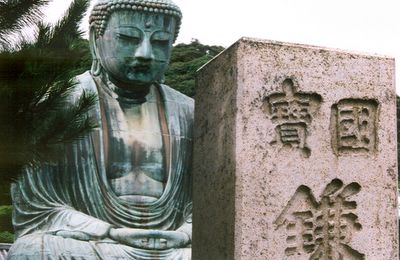Globalize

Kamakura Daibutsu
In 1252, a more than 100-ton statue of the prominent Buddhist divinity Amida (orig., Amitābhā in Sanskrit) was cast by the sculptor Ono Goroemon within the grounds of Kotokuin Temple in the then capital city of Kamakura, 32 miles from present-day Tokyo. The large building that housed the figure was destroyed by storm in 1369, but the Giant Buddha survives today.
On vacation in the Ohio town where I grew up, I think about my first full year in Japan. There are so many things that I haven't quite figured out there and that leave me pondering that, for now, I think I should write about something else. I would write directly about the U.S., but I am losing the stamina required of those who wish to keep abreast competing American politico-media corporations, whose broadcast presence is often equated loosely with "politics," a word that not long ago--before the corporate take-over of mass media began nearing completion--had a very different meaning in American public life. My frequency with them is down. "Politics" used to mean canvassing, talking to other human beings, striving to be aware of one's environment and to nurture it as a commonwealth. This recalls that, increasingly, political participation in the United States means things such as striking postures over details of entertainment programs masquerading as open and fair debates and news.
Getting back to my sheep: I was listening to a French radio station tonight and, to wind up a long dialogue with a sinologist, the host put a final, resounding question: "And," he said, "returning to the matter of urban ghettos being created in China, of the massive exploitation of uprooted agrarians unfit for city life or its need for specialization, of fluent crime creation in the streets and corruption in government, new invitations to the spread of disease both among the population at large and in the industries that serve it... as a respected specialist, what do you see that is particular or unique in the way that globalization is progressing today in Chinese culture and society, as opposed to in the U.S. or E.U.?"
The otherwise eloquent interviewee, after a thought, responded, "nothing!" And with that, the interview was ended.
<< Home